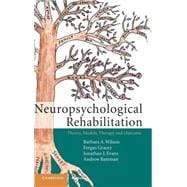
Note: Supplemental materials are not guaranteed with Rental or Used book purchases.
Purchase Benefits
What is included with this book?
| List of contributors | p. vii |
| Foreword | p. ix |
| Preface | p. xi |
| Background and theory | |
| Towards a comprehensive model of neuropsychological rehabilitation | p. 1 |
| Evidence for the effectiveness of neuropsychological rehabilitation | p. 22 |
| Goal setting as a way of planning and evaluating neuropsychological rehabilitation | p. 37 |
| The Oliver Zangwill Centre approach to neuropsychological rehabilitation | p. 47 |
| Group interventions | |
| The Understanding Brain Injury (UBI) Group | p. 68 |
| The Cognitive Group, Part 1: Attention and Goal Management | p. 81 |
| The Cognitive Group, Part 2: Memory | p. 98 |
| The Mood Management Group | p. 112 |
| The Psychological Support Group | p. 123 |
| Working with families in neuropsychological rehabilitation | p. 138 |
| Communication Group | p. 157 |
| Practically based project groups | p. 164 |
| Case illustrations | |
| Peter: successful rehabilitation following a severe head injury with cerebrovascular complications | p. 182 |
| Lorna: applying models of language, calculation and learning within holistic rehabilitation: from dysphasia and dyscalculia to independent cooking and travel | p. 203 |
| Caroline: treating post-traumatic stress disorder after traumatic brain injury | p. 227 |
| Interdisciplinary vocational rehabilitation addressing pain, fatigue, anxiety and impulsivity: Yusuf and his 'new rules for business and life' | p. 237 |
| Judith: learning to do things' at the drop of a hat': behavioural experiments to explore and change the 'meaning' in meaningful functional activity | p. 256 |
| Simon: brain injury and the family - the inclusion of children, family members and wider systems in the rehabilitation process | p. 272 |
| Adam: extending the therapeutic milieu into the community in the rehabilitation of a client with severe aphasia and apraxia | p. 292 |
| Malcolm: coping with the effects of Balint's syndrome and topographical disorientation | p. 304 |
| Kate: cognitive recovery and emotional adjustment in a young woman who was unresponsive for several months | p. 317 |
| Outcomes | |
| Is this approach effective? Outcomes measurement at the Oliver Zangwill Centre | p. 334 |
| Index | p. 350 |
| Table of Contents provided by Ingram. All Rights Reserved. |
The New copy of this book will include any supplemental materials advertised. Please check the title of the book to determine if it should include any access cards, study guides, lab manuals, CDs, etc.
The Used, Rental and eBook copies of this book are not guaranteed to include any supplemental materials. Typically, only the book itself is included. This is true even if the title states it includes any access cards, study guides, lab manuals, CDs, etc.